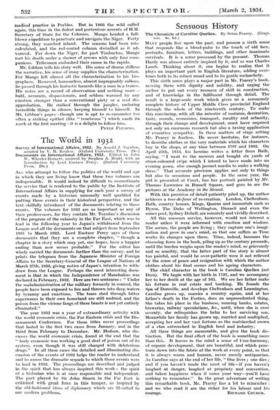The World in 1932 Survey of International Affairs, 1932. By
Arnold J. Toyabee, assisted by V. M. Boulter. (Oxford University Press. '24s.) Documents on International Affairs, 1932. Edited by John W. Wheeler-Bennett, assisted by Stephen A. Heald, with an Introduction by Lord Eustaco Percy. (Oxford University Press. 20s.) ALL who attempt to follow the politics of the world and age in which they are living know that these two volumes are indispensable. It would indeed be difficult to overestimate the service that is rendered to the public by the Institute of
International Affairs in supplying for each year a survey of events made by a historian unusually well qualified for putting those events in their historical perspective, and the text skilfully introduced of the documents relating to those events. The volumes for 1932 are as important as any of their predecessors, for they contain Mr. Toynbee's discussion of the progress of the calamity in the Far East, which was to lead in the following year to Japan's withdrawal from the
League and all the documents on that subject from September 1931 to March 1988. Lord Eustace Percy says of those documents that they are a complete chapter, " though a
chapter in a story which may yet, one hopes, have a happier ending than now seems probable." For the editor has wisely carried the documents further than the survey, and he prints the telegram from the Japanese Minister of Foreign Affairs to the Secretary-General of the League of Nations of March 27th, 1933, giving notice of Japan's intention to with- draw from the League. Perhaps the most interesting docu- ment is that in which the Independence of Manchukuo was declared in February, 1932. Here are two sentences : " Under the maladministration of the military formerly in control, the people have been exposed to fire and thrown into deep waters by tyranny and exactions. The tears shed through bitter experiences in their own homeland are still undried, and the poison from the vicious fangs of these beasts is not yet entirely eliminated."
The year 1932 was a year of extraordinary activity with the world economic crisis, the Far Eastern crisis and the Dis- armament Conference. For these titles cover proceedings that lasted in the first two eases ftom January, and in the third from February to December. Mr. Hodson, who dis- cusses the world economic crisis, found at the end that the " body economic was working a good deal of poison out of its system, even though it was still charged with deleterious drugs." In all these cases the detailed and illuminating dis- cussion of the events of 1932 helps the reader to underitand and to assess the dramatic sequels to which those events were to lead in 1933. The proceedings are described and judged in the spirit that has always inspired this work ; the spirit of a historian who is at once responsible and independent. The part played by Sir John Simon in the Far East is
criticized with great force in this temper, as inspired by the old-fashioned ideas of diplomacy which are ill-suited to our modern problems.




























































 Previous page
Previous page